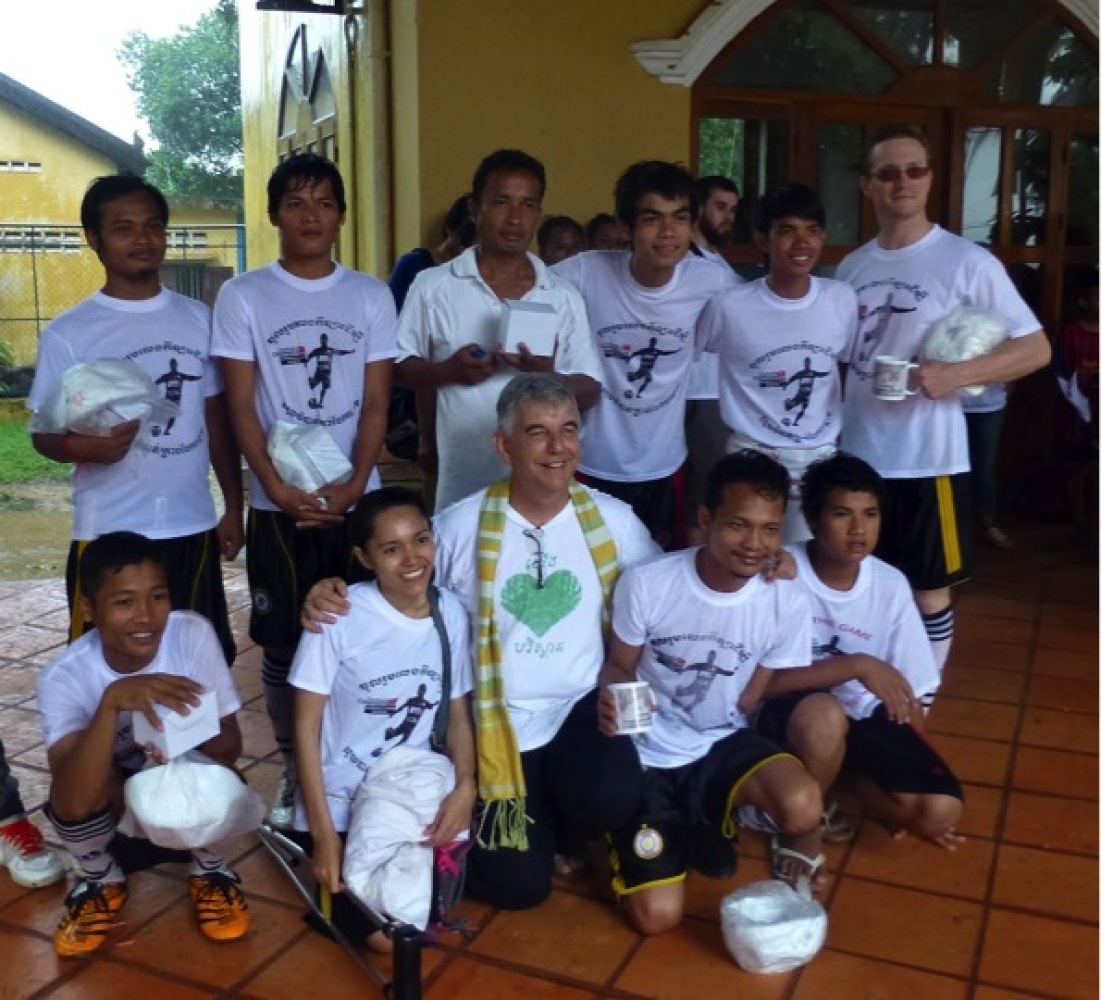
Posted: 08/20/2012
The Huffington Post Katherine Marshall
The London Olympics were in full swing on Aug. 5, but in Battambang,
Cambodia, on the other side of the world, the Oslo Cup pitted four
soccer (or football, as it's called in Cambodia) teams against each
other. The winners? Team Landmine and Cluster Munitions Survivors. It
was an awesome match, worthy of the Olympic ideals of excellence,
respect and friendship. The match finished in drenching rain, stretching
into overtime. Among the heroes was one young man who used his head
instead of the arms he had lost in a landmine accident to shoot a goal.
The tournament took place on the sprawling grounds of the Catholic
Church in Battambang. Jesuit priest Father Enrique Figaredo (known as
Father Kike) is the Apostolic Prefect there. He has worked in Cambodia
almost non-stop since 1985. He works closely with the Jesuit Refugee Service,
Cambodia, which has a long, distinguished track record. Jesuits were
among the first foreigners to return to Cambodia from the refugee camps
on the Thai border after the brutal years of killing under the Khmer
Rouge and its aftermath. The Jesuit Service Cambodia has been and
remains a leader in the International Campaign to ban landmines and
cluster munitions. Indeed, the Nobel Peace Prize that was awarded to the
Campaign lives at the Metta Karuna Reflection Center in Siem Reap.
Oslo was the name and motif for the tournament because of the
upcoming meeting in Norway on cluster munitions in September. The idea
was to raise awareness and encourage the Cambodian government to sign on
formally to the Convention (it has expressed support but not yet signed
officially). The Convention was signed in Dublin in 2008 and came into effect in August 2010.
Cluster munitions and landmines are brutal reminders of the horrors
of war. U.S. bombing and the U.S. invasion of Cambodia happened more
than 40 years ago but the cluster munitions that were dropped then still
explode and people, especially children, lose eyes, limbs and lives.
After intense clearing and education campaigns, landmine accidents are
far less common today than they were. Indeed, an Italian supported
hospital in Battambang whose specialty was treating landmine victims
came close to shutting down early this year because there are "only"
four or so cases a week (the good news is that Japanese philanthropist
Haruhisa Handa stepped in and the hospital is being converted into an
emergency treatment facility).
The tragedy is that both landmines and cluster munitions are still
used in some of the world's hotspots. And that is despite how well we
know that both are extraordinarily difficult to clear. In longtime war
zones like Cambodia and Burma, no one knows exactly where the mines were
laid and they represent a virtual museum of different styles and
histories, lingering long after citizens of the taxpayers of countries
responsible can recall only dimly the history of the wars, far less
their objectives. They still kill and maim.
The Oslo Cup was thus a blend of joyful competition and celebration
and a vivid reminder of the purpose: to raise awareness and keep the
issue of landmines and cluster munitions alive so that something is done
about it. The Cambodia campaign and the Jesuits put on a remarkable
show. The indomitable Denise Coghlan,
a Sister of Mercy originally from Brisbane, Australia, was plainly the
organizing genius at work for the tournament (as well as the Cambodian
campaign). Father Kike was on hand to hand out the awards and to celebrate. I could not keep my eyes off Song Kosal,
a longtime ambassador for the cause. Now 24, she lost her leg to a
landmine when she was 6 and today works for the Campaign. With one leg
and a crutch she literally sprang up and down stairs like an Olympic
gymnast, with a warm smile for everyone.
The Campaigns against Landmines and Cluster Munitions
have united a remarkable variety of people, including celebrities like
Princess Diana and the Pope. Behind the public facades are determined
civil society coalitions. They are motivated, driven, in many cases by a
relentless spiritual passion determined to bring war to an end. Sister
Denise and Father Kike are exemplars of what has made the Landmine and
Cluster munitions campaigns among the world's most successful. They
bring a rare blend of patience, love, outrage, humor, anger and gritty
determination to their work. They know the names and stories of
countless people who are directly affected, young and old, and respect
their courage. At the Siem Reap center where Sister Denise welcomes
refugees and survivors from around the region, there's a painting of a
young boy with one leg pitching hay onto a cart, goaded by his father to
continue life despite his loss. Today ,that boy is a grown man who
brings his son to see the picture and celebrate the courage that
honoring him inspired.
Sister Denise, Father Kike and their collaborators accept only what
is excellent. They offer a true friendship, including a living openness
to different cultures and religions. And they bring a deep, authentic
respect for those they work with and for. They stand for a just peace,
the kind its backers have in mind in pushing for the Olympic Truce.
Those are the values behind the Olympic Movement and they were very much
on display at the Battambang Oslo cup.

No comments:
Post a Comment